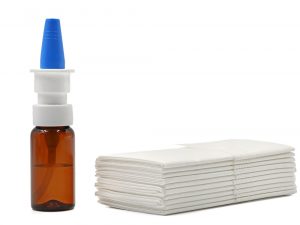Sinusitis assessment
Welcome to Qoctor’s online doctor service which can provide assessment for sinusitis. Answer some simple questions, then book a video consultation for $31.99. If the doctor issues a prescription, you can have it sent direct to your local pharmacy.
Please note: our doctors assess each patient individually, creating a treatment plan based on symptoms & medical history. Whilst antibiotics may be recommended in suitable cases where a bacterial infection is deemed likely, it is important to note that other treatments are often issued if the doctor diagnoses a viral illness. All advice and treatment is issued subject to your consultation and doctor’s assessment.
About Acute Sinusitis
- The sinuses are hollow spaces within your facial bones. Sinusitis is when these spaces become inflamed. Acute sinusitis is a common issue following a common cold or influenza. Often, it occurs when a person has already had a head cold/flu for 5 or 6 days, when the typical symptoms start to develop.
- In the majority of cases, acute sinusitis is caused by a viral infection, and therefore antibiotics are not helpful.
- Common symptoms include facial pain or pressure that feels worse when you lean forward/bend over, a congested/stuffy nose, and/or nasal discharge which can be yellow/green.
- Other symptoms of sinusitis include a sense of pressure in the ears, headache, altered sense of smell, aching teeth, cough. bad breath, tiredness and fever/high temperature.

Common Questions and Answers
It is not necessarily possible to entirely avoid getting sinusitis, but some strategies that may help include:
- avoid smoking/smoke exposure/air pollution exposure
- proactively manage any hay fever or dust allergies with appropriate treatment- get advice from your doctor or pharmacist if you are unsure.
- avoid exposure to respiratory viruses, stay away from people who are known to be unwell with common colds/flus.
- some people find using an air humidifier in their living space can help, particularly if their home heating/air conditioning system causes the air to be very dry. Humidifiers need to be properly cleaned/ maintained, to avoid mold developing.
If you are getting frequent sinus infections despite taking the above steps, speak to your doctor for advice.
In most cases, sinusitis gets better by itself, after a few days/weeks. Supportive treatment can include:
- saline nasal sprays
- decongestant sprays (for a limited period of time- always read the label! Overuse can lead to “rebound” or worsening symptoms.)
- anti allergy nasal sprays (which may contain corticosteroids and/or an antihistamine)
- simple over the counter analgesia (painkillers) from the pharmacy
- antihistamine medications (if allergies are contributing to your symptoms)
Antibiotics are sometimes prescribed where it appears there may be a bacterial sinus infection that is not getting better by itself.
In most cases, sinusitis follows on from a common cold or flu like illness. However, some other conditions can make sinusitis more likely to occur, such as:
- hay fever
- smoking or passive smoking
- physical abnormalities in the nose/sinuses that affect drainage- e.g. a deviated septum or polyps.
- a compromised immune system
- a medical condition such as Cystic Fibrosis
In some cases, a bout of sinusitis can continue for more than 3 months- this is known as chronic sinusitis. Some people who suffer from chronic sinusitis continue to have mild symptoms on an ongoing basis, with flare ups of acute sinusitis from time to time. Serious complications of acute sinusitis are rare, but can include meningitis, cellulitis (skin/soft tissue infection), and spread of bacterial infection to other parts of the body.
In the majority of cases, sinusitis can be diagnosed based on the history of your symptoms. Sometimes a doctor may recommend further testing, such as a scan/imaging, if symptoms are continuing for months. If you have ongoing or frequently recurring symptoms, you may also need to be referred to an Ear Nose and Throat specialist who may wish to perform a camera test (nasal endoscopy), to take a closer look at your nasal passages and sinuses. A nasal swab to test for certain infections, or tests to check for allergies may also be occasionally considered in such cases.
Yes, in most cases, acute sinusitis gets better after a few weeks, with simple, supportive treatment, such as rest, fluids and over-the-counter nasal sprays/painkillers, However, in some cases, if it is getting worse or not settling in the expected timeframe, a doctor may consider prescribed treatments.
Sinusitis that lasts longer than 12 weeks is said to be “chronic”. Some people suffer from mild chronic sinusitis and experience flare ups where it becomes “acute” and more symptomatic.
The most common symptoms of acute sinusitis are:
- facial pain or pressure that feels worse when you lean forward/bend over.
- congested or stuffy nose
- nasal discharge which may be yellow/green
Other symptoms include:
- A sense of pressure in the ears
- Headache
- Impaired sense of smell
- An ache in your teeth
- Cough
- Halitosis (bad breath)
- Fatigue
- Fever
Health Library
Swimmer’s Ear- causes, symptoms & treatment
Swimmer's Ear-causes, symptoms & treatment What is Swimmer’s Ear? Swimmer’s ear is an infection or inflammation of the outer parts of ear. It is also known as Otitis Externa. In Swimmer’s Ear there is inflammation of the outer ear canal (the part between your outer ear and eardrum). The skin that lines the ear canal becomes inflamed, irritated and swollen, due to a bacterial or fungal infection. While it is commonly known as Swimmer’s Ear, you don’t have to go swimming to get it- there are other possible triggers. What conditions can be assessed by our doctors? What causes Swimmer’s Ear? If your ears get wet, the skin inside the ear canal can become waterlogged and softened, which can make it easier for infection to set in. Swimming or bathing in dirty water that contains bacteria may also [...]
What causes blocked ears?
What causes blocked ears? What causes blocked ears? People often attend the doctor complaining of blocked ears. There are several common causes of blocked ears that a doctor will usually check for. Here are some of the most frequent issues. Ear wax Glands in the skin inside your ears naturally make wax (also called cerumen), which protects the ear canal by trapping germs and dust. Usually the wax makes its way slowly outwards to the opening of the ear, and the ears are naturally “cleaned”. However, sometimes wax builds up, leading to a sense of blocked ears, and occasionally discomfort, irritation or tinnitus (buzzing or ringing in the ears). Things that make people more prone to build-up of ear wax include narrow ear canals, hairy ears, living or working in dusty environments, overly vigorous cleaning of the ears (e.g. with cotton buds), eczema, or [...]
Vertigo- symptoms, causes & treatment
Vertigo- symptoms, causes & treatment what is Vertigo? diagnosis causes treatment What is vertigo? Light-headedness, faintness or dizziness are not the same as vertigo. A fear of heights is also not vertigo. Vertigo is defined as the feeling you’re moving when you’re not. It’s usually a sensation of spinning. Being clear on this single detail is very important. Vertigo is often accompanied by nausea, vomiting & sweating. What tests will the doctor do for vertigo? The most important thing the doctor will do is to ask you detailed questions about your vertigo, for example: How long have you had it? Does it come and go? How long does each episode last? Is your hearing affected? Do you have any ringing in your ears (tinnitus)? Is it affected by head position or head movements? [...]



